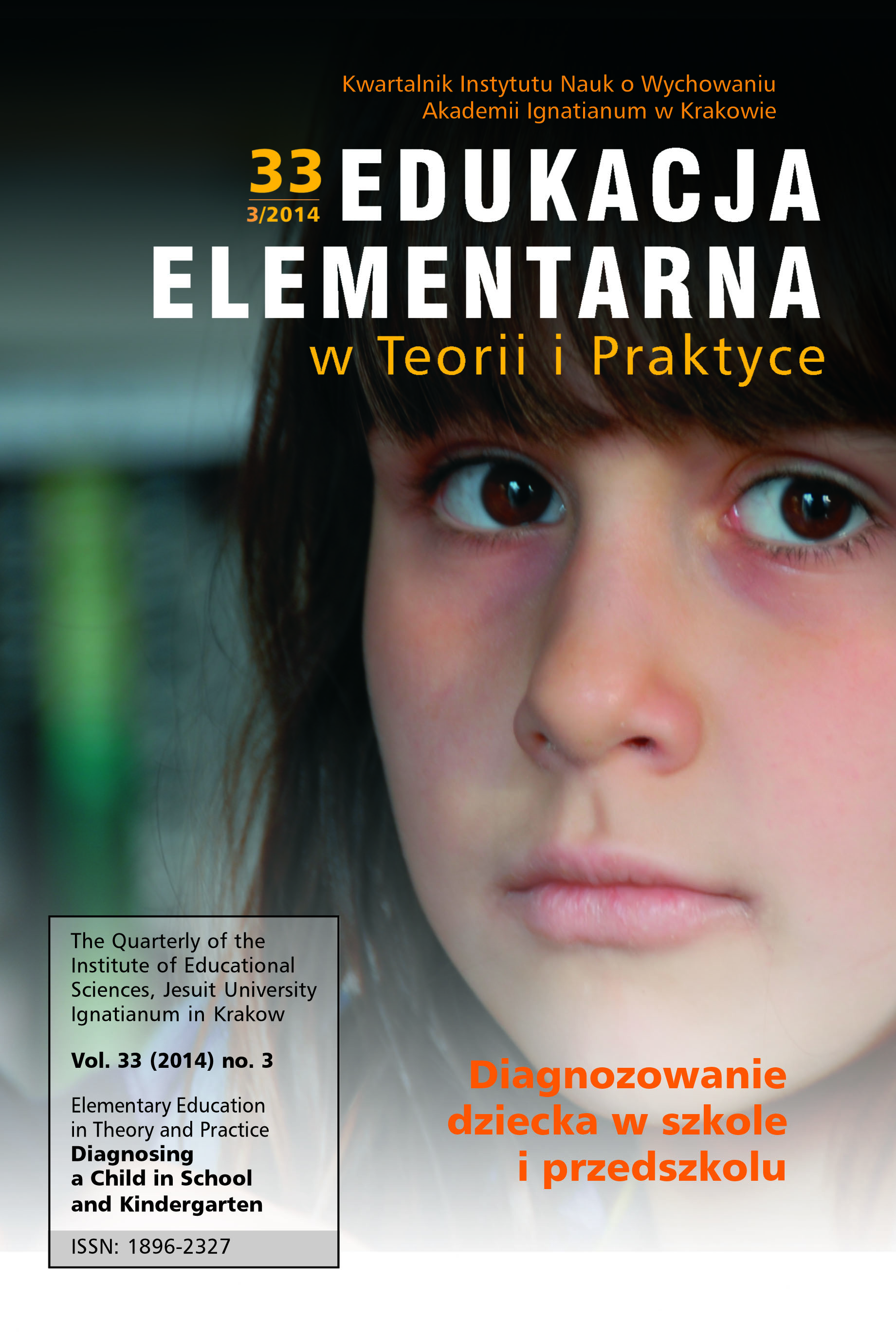Gotowość szkolna dzieci 5- i 6-letnich w zakresie kompetencji matematycznych – analiza porównawcza
Abstrakt
Debata o obniżeniu wieku szkolnego toczy się w Polsce od kilku lat. Ministerstwo Edukacji Narodowej przekonuje, że dzieci przed szkołą nie trzeba ratować, a raczej do niej posłać wykorzystując najlepszy okres w ich rozwoju. Kolejne argumenty przemawiające za wcześniejszym rozpoczęciem nauki dotyczą wyrównywania szans edukacyjnych oraz dostępu do lepszej infrastruktury naukowej, sportowej i informatycznej. Odmienne zdanie na temat wcześniejszego przekroczenia progu szkoły prezentują rodzice, nauczyciele, a także psycholodzy. Zauważają oni, że braki w przygotowaniu szkół pod względem prawnym, kadrowym i organizacyjnym są drastyczne i dotyczą m.in. nauczycieli, rozwiązań całodziennej opieki wykraczającej poza plan zajęć, regulacji dotyczących okresu wakacji szkolnych, terenów zabaw. W kontekście opisanej wyżej sytuacji diagnoza gotowości szkolnej nabiera szczególnego znaczenia. Obrazuje ona pewne możliwości i predyspozycje dziecka, ale ukazuje także jego ograniczenia i braki. Jej nadrzędnym celem jest opracowanie indywidualnego planu pracy z dzieckiem w celu zapewnienia i umożliwienia wszystkim przyszłym uczniom względnie równego startu w szkole. W artykule przedstawiono wyniki badań diagnozy gotowości szkolnej w zakresie kompetencji matematycznych. Problem główny został sformułowany w postaci pytania: Jaki jest poziom gotowości szkolnej dzieci 5- i 6-letnich uczęszczających do Przedszkola Miejskiego nr 1 w Rabce-Zdroju? Uzyskane w trakcie badań wyniki wskazują, że dzieci sześcioletnie w większości przypadków osiągnęły wysoki poziom gotowości szkolnej w zakresie umiejętności potrzebnych do uczenia się matematyki w klasie pierwszej. Młodsze przedszkolaki (pięciolatki), nie dysponują jeszcze wystarczającym poziomem przygotowania do szkoły. Warunkiem sukcesów edukacyjnych pięciolatków jest intensywny proces stymulowania umiejętności liczenia oraz ustalania prawidłowych sum i różnic. Ocena gotowości szkolnej prowadzona była jednorazowo, co uniemożliwia ukazanie różnic, jakie zaszły w procesie rozwoju myślenia u dzieci w ciągu roku edukacji przedszkolnej. Dokumentuje ona jednak stan aktualny rozwoju dziecka, prezentuje stopień jego kompetencji szczególnie w zakresie matematyki, inspiruje do dalszej, pogłębionej refleksji oraz prowadzenia kolejnych badań.
Bibliografia
Babiarz M.Z., Zróżnicowany rozwój uczniów po obniżeniu wieku obowiązku szkolnego, „Nauczanie Początkowe”, 37(2013/2014)4.
Baley S., Psychologia wychowawcza w zarysie, PWN, Warszawa 1958.
Bogdanowicz M., Lisowska N., Gotowość do nauki czytania i pisania a ryzyko dysleksji u sześciolatków, „Dysleksja”, 16(2013)2.
Brudniak-Drąg A., Wcześniejsze rozpoczęcie edukacji w opinii rodziców czterolatków – komunikat z badań, „Nauczanie Początkowe”, 37(2013/2014)4.
Brzezińska A., Gotowość dzieci w wieku przedszkolnym do czytania i pisania, Wydawnictwo Naukowe Uniwersytetu im. Adama Mickiewicza w Poznaniu, Poznań 1987.
Derewlana H., Michalska B., Świątek J., Wosińska B., Karty do diagnozowania gotowości szkolnej, Warszawa 2012.
Goc J., Kiedy dziecko jest gotowe do szkoły, „Bliżej Przedszkola”, 124(2012)1.
Grabek A., Front za sześciolatkami, „Rzeczpospolita”, 9541(2013)21.
Gruszczyk-Kolczyńska E., Dzieci ze specyficznymi trudnościami w uczeniu się matematyki. Przyczyny, diagnoza, zajęcia korekcyjno-wyrównawcze, WSiP, Warszawa 1992.
Gruszczyk-Kolczyńska E., Zielińska E., Nauczycielska diagnoza edukacji matematycznej dzieci. Metody, interpretacje i wnioski, Nowa Era, Warszawa 2013.
Jagła A., Gotowość szkolna sześciolatka, „Życie Szkoły” 748(2013)7.
Klus-Stańska D., Szkoła dla dziecka czy dziecko dla szkoły, czyli garść uwag o gotowości szkolnej, „Dysleksja”, 16(2013)2, s. 17.
Kozera-Mikuła P., Problematyka dojrzałości szkolnej dziecka, „Nauczanie Początkowe”, 37(2013/2014)4.
Przetacznikowa M., Rozwój psychiczny dzieci i młodzieży, PZWS, Warszawa 1967.
Surma B., Gotowość szkolna do uczenia się matematyki dzieci sześcioletnich w przedszkolu Montessori – raport z badań, „Edukacja Elementarna w Teorii i Praktyce”, 28(2013)2, s. 36–37.
Ustawa z dnia 7 września 1991 roku o systemie oświaty, Dz. U. z 2004 r. Nr 256, poz. 2572 z późniejszymi zmianami.
Wiatrowska L., Dmochowska H., Dziecko u progu szkoły. Dojrzałość szkolna dzieci a ich gotowość do nauki, Impuls, Kraków 2013, s. 14.
Wilgocka-Okoń B., Gotowość szkolna dzieci sześcioletnich, Wydawnictwo Akademickie Żak, Warszawa 2003, s. 10.
Wolański N., Problem dojrzałości szkolnej – w świetle auksologii, „Wychowanie Fizyczne i Zdrowotne”, 524(2013)2, s. 14–20.
Copyright (c) 2014 Edukacja Elementarna w Teorii i Praktyce

Utwór dostępny jest na licencji Creative Commons Uznanie autorstwa – Bez utworów zależnych 4.0 Międzynarodowe.
1. Autor zgłaszając swój artykuł oświadcza, że jest Autorem artykułu (zwanego dalej Utworem) i:
- przysługują mu wyłączne i nieograniczone prawa autorskie do Utworu,
- jest uprawniony/a do rozporządzania prawami autorskimi do Utworu.
Oświadcza, że nie narusza praw autorskich osób trzecich i praw prawnych.
Oświadcza, że nie występuje żaden konflikt interesów.
2. Udziela Uniwersytetowi Ignatianum w Krakowie nieodpłatnej, niewyłącznej, nieograniczonej terytorialnie licencji do korzystania z Utworu na następujących polach eksploatacji:
- utrwalania utworu w formie papierowej, a także na nośniku cyfrowym lub magnetycznym;
- zwielokrotnienia utworu dowolną techniką, bez ograniczenia ilości wydań i liczby egzemplarzy;
- rozpowszechniania utworu i jego zwielokrotnionych egzemplarzy na jakimkolwiek nośniku, w tym wprowadzenia do obrotu, sprzedaży, użyczenia, najmu;
- wprowadzenia utworu do pamięci komputera;
- rozpowszechniania utworu w sieciach informatycznych, w tym w sieci Internet;
- publicznego wykonania, wystawienia, wyświetlenia, odtworzenia oraz nadawania i reemitowania, a także publicznego udostępniania utworu w taki sposób, aby każdy mógł mieć do niego dostęp w miejscu i czasie przez siebie wybranym;
- w zakresie praw zależnych do Utworu, obejmujących w szczególności prawo do dokonania koniecznych zmian w Utworze, wynikających z opracowania redakcyjnego i metodycznego, a także do dokonania tłumaczenia Utworu na języki obce.
Udzielenie licencji następuje z chwilą przekazania Utworu na rzecz Uniwersytetowi Ignatianum w Krakowie. Uniwersytet Ignatianum w Krakowie jest uprawniony do udzielania dalszych sublicencji do Utworu, w zakresie udzielonego prawa. Licencja jest ograniczona czasowo i zostaje udzielona na okres 15 lat, licząc od daty jej udzielenia.
Wyraża się zgodę i zachęca autorów do publikacji ich tekstu w Internecie (np. w repozytorium instytucji lub na jej stronie internetowej) przed lub podczas procesu składania tekstu jako, że może to prowadzić do korzystnych wymian oraz wcześniejszego i większego cytowania opublikowanego tekstu (Patrz The Effect of Open Access). Zalecamy wykorzystanie dowolnego portalu stowarzyszeń badawczych z niżej wymienionych:




